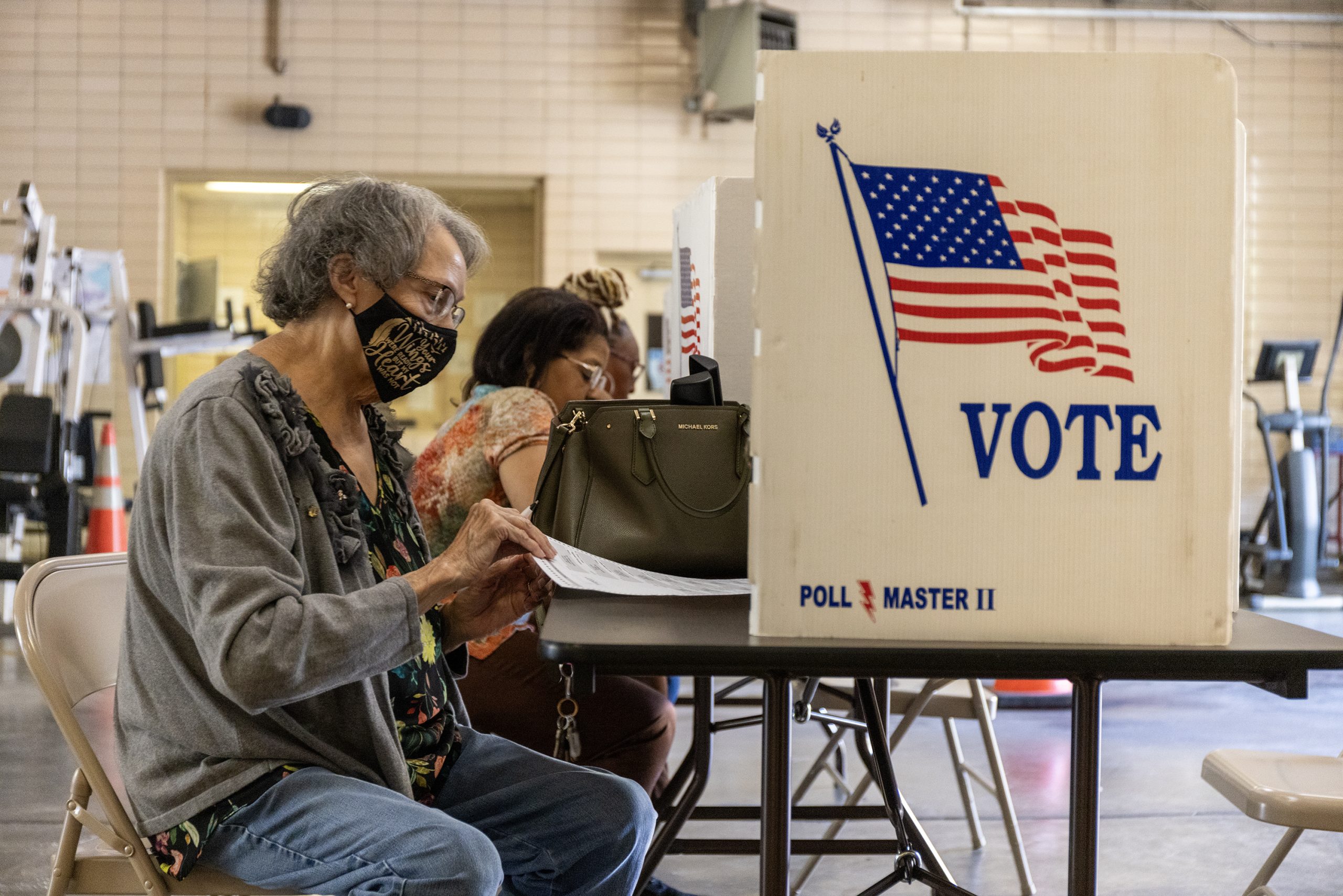Mississippi Today
Legislative candidate considers election challenge after Hinds County ballot shortage

An unsuccessful candidate for the state Legislature wants to file an election challenge over the Hinds County ballot shortage issues, but she's worried she won't have the necessary money to fund the litigation.
Sharon Moman, the Democratic nominee for House District 56, lost her bid for the legislative seat that covers portions of Hinds and Madison counties to a Republican candidate.
She told Mississippi Today that she heard from countless Hinds County voters who tried to vote for her on Election Day, but they simply decided to leave their polling precinct after poll workers told them they had no ballots.
“The ripple effect with a lack of ballots just continued all day long,” Moman said.
Moman received roughly 2,564 votes or 33% of the total vote. Her Republican opponent, Clay Mansell, received 5,043 votes, or roughly 66% of the total vote. Mansell declined to comment on a potential election challenge.
READ MORE: Hinds County ballot shortages cause legal mess on Election Day
The House district is outgoing House Speaker Philip Gunn's seat and contains a Black voting age population of 27%, according to the Joint Legislative Committee on Reapportionment and Redistricting.
In Mississippi, Black voters are more likely to support Democratic candidates, while white voters are more likely to vote for Republican candidates, making it extremely difficult for Moman to win the House district.
But the Jackson suburban area contains a high concentration of college-educated voters, who, nationally, have been more likely to vote for Democratic candidates in recent years.
“I'm disappointed,” Moman said. “I want to file a challenge because that 33% number I got was just disappointing to see. People are going to incorrectly think it's not a winnable district for a Democrat or for a woman.”
Numerous precincts in Hinds County ran out of ballots on Election Day, which left some voters waiting in line for hours and caused others to give up and go home. Several voters submitted sworn affidavits to state courts expressing frustration over the fiasco.
The ballot shortages spurred legal action from multiple organizations before the normal poll closing time at 7 p.m., and a chancery court judge ordered all Hinds County precincts to stay open until 8 p.m. to allow more people to vote.
State law allows candidates to file an election challenge over the general election by Monday, Nov. 27.
In an election challenge, the chief justice of the Mississippi Supreme Court appoints a special judge to provide over the litigation. The special judge would make an initial determination if a candidate should receive any type of relief, but the decision would be appealable to the state Supreme Court.
A candidate would likely have to pay an attorney to spend resources filing briefs, researching case law, paying court fees and securing potential witnesses to testify — funds Mansell says she does not have.
The current composition of Supreme Court justices has consistently ruled in recent years that if candidates do not follow the statutory timeline for filing election challenges, their claims cannot be substantively considered.
If Moman does not file such a challenge by Monday, then Mansell will be the new state lawmaker for the district.
READ MORE: Judge extends Hinds County precinct hours after numerous ballot problems
This article first appeared on Mississippi Today and is republished here under a Creative Commons license.
Mississippi Today
On this day in 1896


MAY 18, 1896

The U.S. Supreme Court ruled 7-1 in Plessy v. Ferguson that racial segregation on railroads or similar public places was constitutional, forging the “separate but equal” doctrine that remained in place until 1954.
In his dissent that would foreshadow the ruling six decades later in Brown v. Board of Education, Justice John Marshall Harlan wrote that “separate but equal” rail cars were aimed at discriminating against Black Americans.
“In the view of the Constitution, in the eye of the law, there is in this country no superior, dominant, ruling class of citizens,” he wrote. “Our Constitution in color-blind and neither knows nor tolerates classes among citizens. In respect of civil rights, all citizens are equal before the law. The humblest is the peer of the most powerful. The law … takes no account of his surroundings or of his color when his civil rights as guaranteed by the supreme law of the land are involved.”
This article first appeared on Mississippi Today and is republished here under a Creative Commons license.
Did you miss our previous article…
https://www.biloxinewsevents.com/?p=359301
Mississippi Today
Renada Stovall, chemist and entrepreneur
Renada Stovall sat on the back deck of her rural Arkansas home one evening, contemplating life when she had a life-altering epiphany…
“I gotta get out of these woods.”
She heard it as clear as lips to her ear and as deep as the trees surrounding her property. Stovall's job as a chemist had taken her all over the country. In addition to Arkansas, there were stints in Atlanta, Dallas and Reno. But she was missing home, her parents and friends. She also knew, she needed something else to do.
“I thought, what kind of business can I start for myself,” said Stovall, as she watered herbs growing in a garden behind her south Jackson home. Some of those herbs are used in her all-natural products. “I know when I lived in Reno, Nevada, where it's very hot and very dry, there really weren't products available that worked for me, my hair, and my skin suffered. I've got a chemistry degree from Spelman College. I took the plunge and decided to create products for myself.”

In 2018, Stovall's venture led to the creation of shea butter moisturizers and natural soaps. But she didn't stop there, and in December 2022, she moved home to Mississippi and got to work, expanding her product line to include body balms and butters, and shampoos infused with avocado and palm, mango butter, coconut and olive oils.
Nadabutter, which incorporates Renada's name, came to fruition.

Stovall sells her balms and moisturizers at what she calls, “pop-up markets,” across the state during the summer. She's available via social media and also creates products depending on what of her ingredients a customer chooses. “My turmeric and honey is really popular,” Stovall added.
“The all-natural ingredients I use are great for conditioning the skin and hair. All of my products make you feel soft and luscious. The shea butter I use comes from West Africa. It's my way of networking and supporting other women. And it's my wish that other women can be inspired to be self-sufficient in starting their own businesses.”





This article first appeared on Mississippi Today and is republished here under a Creative Commons license.
Mississippi Today
On this day in 1954
MAY 17, 1954

In Brown v. Board of Education and Bolling v. Sharpe, the U.S. Supreme Court unanimously ruled that the “separate but equal” doctrine in Plessy v. Ferguson was unconstitutional under the 14th Amendment, which guaranteed equal treatment under the law.
The historic decision brought an end to federal tolerance of racial segregation, ruling in the case of student Linda Brown, who was denied admission to her local elementary school in Topeka, Kansas, because of the color of her skin.
In Mississippi, segregationist leaders called the day “Black Monday” and took up the charge of the just-created white Citizens' Council to preserve racial segregation at all costs.
This article first appeared on Mississippi Today and is republished here under a Creative Commons license.
-
SuperTalk FM6 days ago
Martin Lawrence making 3 stops in Mississippi on comedy tour
-
Our Mississippi Home4 days ago
Beat the Heat with Mississippi’s Best Waterparks
-
SuperTalk FM2 days ago
State auditor cracking down on Mississippians receiving unemployment benefits
-
Our Mississippi Home5 days ago
Charlie’s U-Pik: Opening Soon for the Summer Season
-
Mississippi News Video4 days ago
Jackson has a gang problem
-
Kaiser Health News5 days ago
Medicaid ‘Unwinding’ Decried as Biased Against Disabled People
-
228Sports4 days ago
George County Pours Runs In 6A South State Title Victory At PRC
-
Local News1 day ago
Family files lawsuit after teen’s suicide in Harrison County Jail









































